On the Lyric Opera stage, pianist Lang Lang lends Schubert, Chopin a tenor of virtuosity
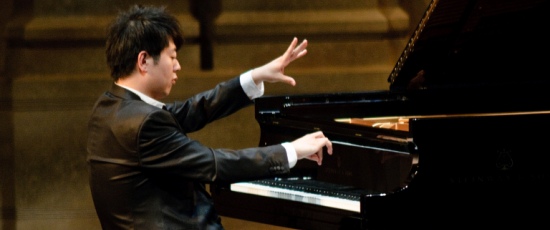 Review: Lang Lang piano recital, presented by the Lyric Opera of Chicago, May 12. ****
Review: Lang Lang piano recital, presented by the Lyric Opera of Chicago, May 12. ****
By Nancy Malitz
An operatic scene was set for the recital of 29-year-old Chinese pianist Lang Lang at the Civic Opera House on May 12.
To ease viewing for an audience of 3,500-plus, a large projection screen was hung to relay a dramatic vantage point straight above the keys and strings.
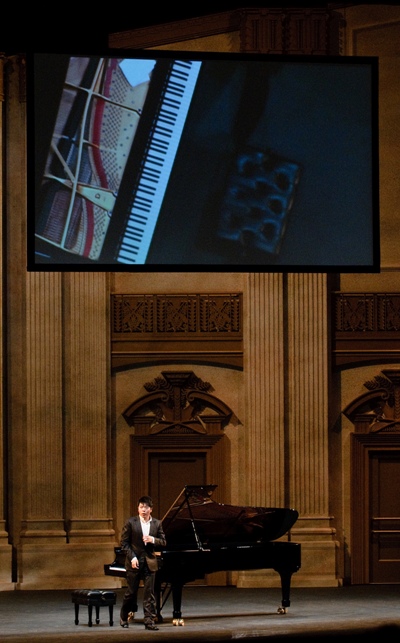 When fans walked in, the camera was already relaying the abstract overhead melange of ivory and ebony, gold and cardinal red. It made for a jolly collage with the stage’s proscenium arch — very Roy Lichtenstein meets Art Nouveau.
When fans walked in, the camera was already relaying the abstract overhead melange of ivory and ebony, gold and cardinal red. It made for a jolly collage with the stage’s proscenium arch — very Roy Lichtenstein meets Art Nouveau.
Lang Lang is the closest thing classical piano has to a rock star today. For all the event’s outsized excitement, however, Lang Lang’s performance was quietly elegant, cogently argued and intensely focused. That is, until Chopin’s titanic Études, Op. 25, where Lang Lang gave himself joyfully over to the virtuosic end of it, and who could blame him? His technique is such that he can do anything he wants. His performance of these most difficult pieces was not only breathtakingly inventive but almost impossibly masterful.
Lang Lang built the program thoughtfully, beginning with Bach’s Partita No. 1 in B-flat major, which every schoolchild pianist, if serious at all, has studied at least in part. The Praeludium is elaborate, but not very fast, and it gave listeners a chance to toggle visually between the straight-ahead pianist in profile and the overhead shot of Lang Lang’s calmly positioned hands in service to the keys.
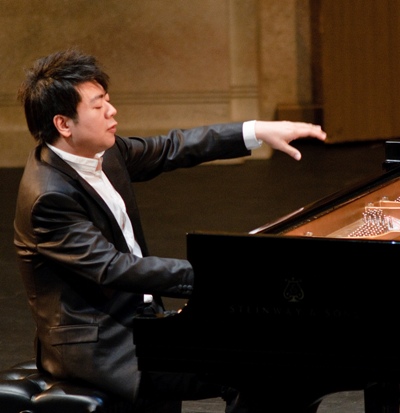 But by the second movement, an Allemande that Lang Lang took at a very fast clip, the overhead view became something of a funhouse experience. From close up on the main floor, the video tracked a tiny fraction of a second slower than the sound emanating from the stage.
But by the second movement, an Allemande that Lang Lang took at a very fast clip, the overhead view became something of a funhouse experience. From close up on the main floor, the video tracked a tiny fraction of a second slower than the sound emanating from the stage.
Perhaps somewhere in the middle of the first or second balcony, sight and sound lined up perfectly, but it was a truly bizarre experience to already hear the impact of a note just as the finger was starting to touch it or — as the pace became more blistering — to see hands dropping when they should have been bouncing up, etc.
 Eventually, one adjusts to such screens rather as one gets used to a new pair of glasses, but I did find myself making a conscious choice whether to avert my eyes from the overhead, or to endure the sonic vertigo.
Eventually, one adjusts to such screens rather as one gets used to a new pair of glasses, but I did find myself making a conscious choice whether to avert my eyes from the overhead, or to endure the sonic vertigo.
Next came Schubert’s last sonata, also in B-flat major, written in the shadow of death when the composer was 31, not much older than Lang Lang is now. Perhaps no work of the evening did more to impress one with Lang Lang’s increasing maturity in what was nevertheless a young man’s performance. His choices were quirky at times, yet essentially reflective and gentle in nature, as if to convey a Schubert who was freely telescoping the random vivid impressions of his short lifetime.
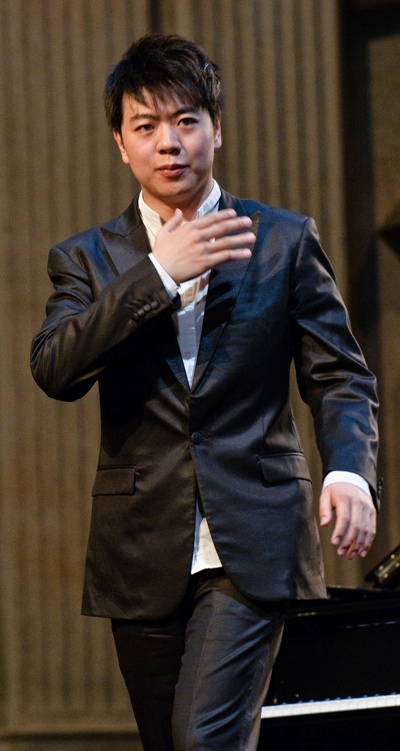 Lang Lang blew the top off the recital with the 12 Études of Chopin, Op. 25, which ended the program. Lang Lang understands Chopin instinctively, a virtuoso like himself who stunned Paris with his first set of Études (Op. 10) at the age of 20. In his mid-twenties, Chopin wrote the second set, another encyclopedia of technical approaches to developing, grace, fluidity, precision, ferocious speed and power.
Lang Lang blew the top off the recital with the 12 Études of Chopin, Op. 25, which ended the program. Lang Lang understands Chopin instinctively, a virtuoso like himself who stunned Paris with his first set of Études (Op. 10) at the age of 20. In his mid-twenties, Chopin wrote the second set, another encyclopedia of technical approaches to developing, grace, fluidity, precision, ferocious speed and power.
Pianists who struggle with these Études might have come hoping to obtain secrets — novel fingerings perhaps, or hand positions, any tricks or shortcuts that Lang Lang employed to execute the rapid parallel thirds, sixths and octaves, repeated leaps and tricky arpeggiated patterns. Not much luck there.
As the overhead view demonstrated, Lang Lang’s secret was, like Chopin’s, utter control. It was amazing, in fact, how calm his torso, arms and hands seemed to be throughout each series of rapid movements; nothing interfered, no energy seemed wasted. One hopes that sometime soon a perfectly synchronized DVD of the Études shot from that overhead angle will be available to preserve the mesmerising display.
Lyric Opera reported the size of the audience to be within a few seats of the hall’s 3,563 capacity, and the crowd itself was a lively mix. There were opera fans and non-opera fans, piano teachers of lofty reputation and some young keyboard virtuosos who would not make the 40-inch height requirement for ordinary roller-coaster rides.
To everyone’s extreme delight, Lang Lang performed Chopin’s Op. 10, No. 3 Étude and Liszt’s Grand Paganini Étude “La Campanella” as encores.
Related Links:
- Lang Lang on Bach, Schubert and Chopin: Exclusive interview at Chicago On the Aisle
- Lang Lang website and discography: Go to www.langlang.com
- Lang Lang performs Chopin’s Étude Op. 10, No. 3 as an encore in Vienna: See it on YouTube
- Lang Lang performs Bach’s Partita No. 1 in B-flat major: Listen from Berlin
- Lang Lang rehearses Schubert’s Military March with 100 piano students: View it on YouTube
- Excerpts of Lang Lang’s 2008 Carnegie Hall debut: View it on YouTube
- Lang Lang and Daniel Barenboim play Mozart 4 Hands: View it at YouTube
Photo captions and credits: Home page, above and below — Lang Lang, 29, in his Civic Opera House debut, presented by the Lyric Opera of Chicago. (Photos by Robert Kusel/Lyric Opera)

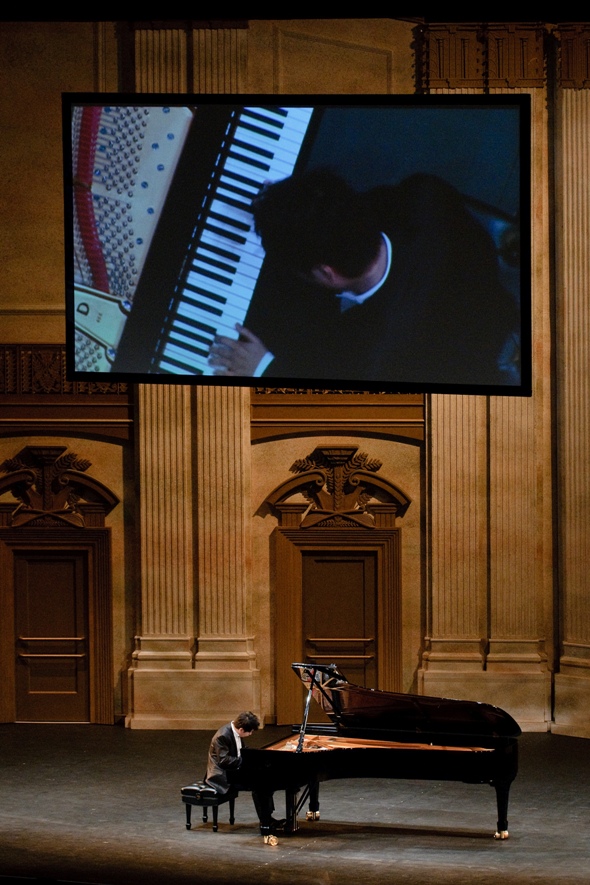

When fellow Curtis-brewed Chinese pianist Yuja Wang bursted onto the international musical scene, EVERY ‘right-minded’ critic hailed the birth of a true Chinese pianistic genius, and predicted that the ‘fake’ ones like Lang Lang would languish and forgotten.
Alas, coming up to 5 full years since the debut of Yuja Wang, and her standing-in for Martha Argerich, audiences are given choices instead of any sort of ‘annihilation’, though predominantly, voices are for a “WANG DOMINANCE” over the pianistic scene in the yet coming 5 years.
Giving the enormous hype as well as outlandish way Wang has chosen to engulf herself in, including but not limited to ‘Suzie Wong’ type of modern courtesan attire in the first-rate concert halls, this may eventually come true in the wake of Western recession not merely in monetary but also in aethestic terms.
That said, it is still yet uncertain what the utterly unpredictable Lang Lang may, notwithstanding the upsurge of vulgarity in a totally different form in his adversary, has in store to hold the attention of the pianistic masses.
When fellow Curtis-brewed Chinese pianist Yuja Wang bursted onto the international musical scene, EVERY ‘right-minded’ critic hailed the birth of a true Chinese pianistic genius, and predicted that the ‘fake’ ones like Lang Lang would languish and forgotten.
Alas, coming up to 5 full years since the debut of Yuja Wang, and her standing-in for Martha Argerich, audiences are given choices instead of any sort of ‘annihilation’, though predominantly, voices are for a “WANG DOMINANCE” over the pianistic scene in the yet coming 5 years.
Giving the enormous hype as well as outlandish way Wang has chosen to engulf herself in, including but not limited to ‘Suzie Wong’ type of modern courtesan attire in the first-rate concert halls, this may eventually come true in the wake of Western recession not merely in monetary but also in aethestic terms.
That said, it is still yet uncertain what the utterly unpredictable Lang Lang may, notwithstanding the upsurge of vulgarity in a totally different form in his adversary, has in store to hold the attention of the pianistic masses.